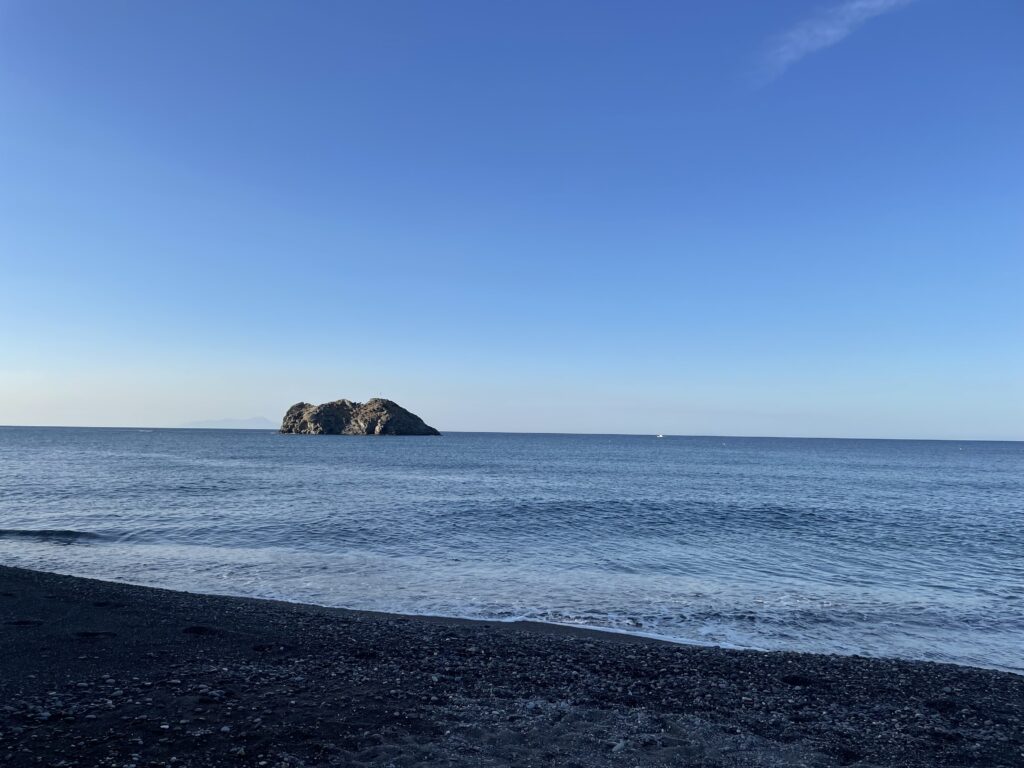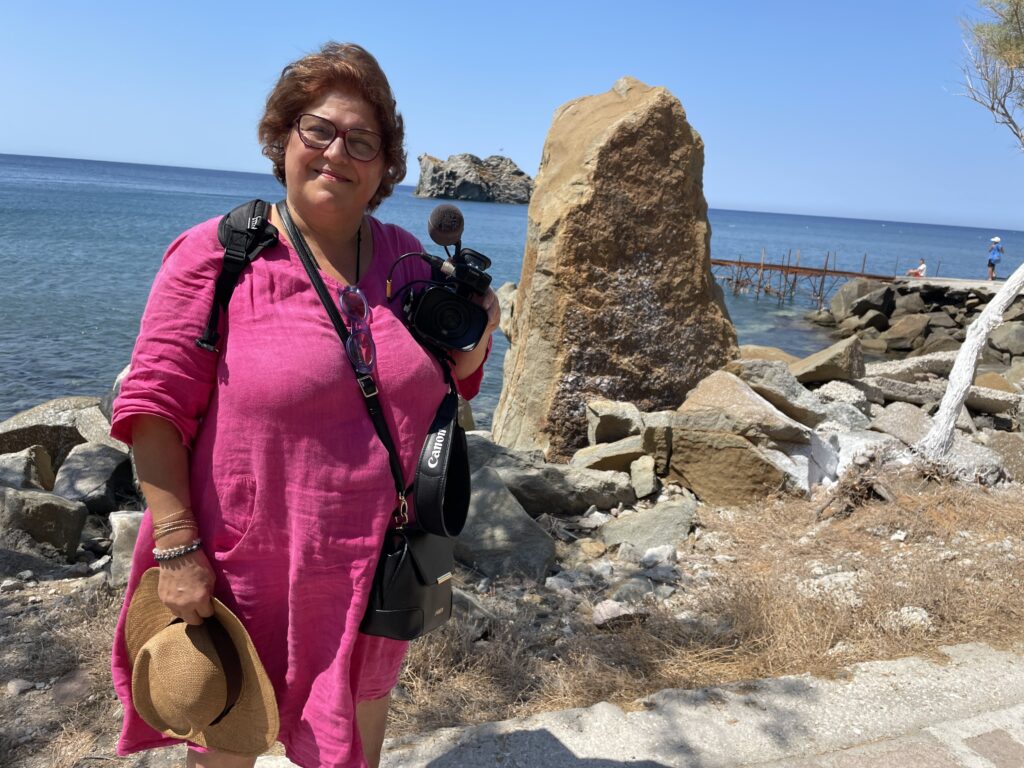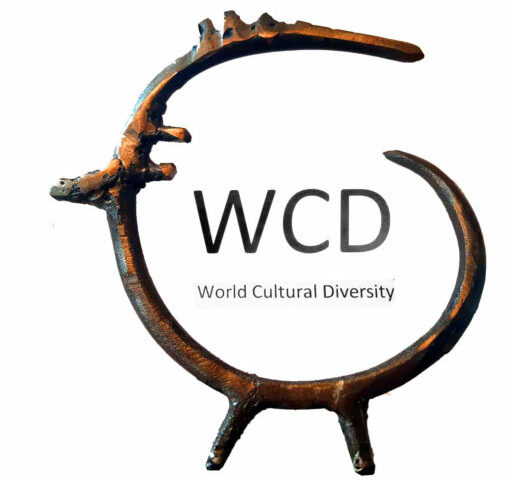On the path of Theophrastus, The father of ecology a film by Mina Rad, 45 minutes, 2023, World Cultural Diversity, France/Greece
Synopsis in English
« Common house is Earth, for both gods and humans. And we must all, bending on her as our nurse and mother, praise and love her with affection, because she gave birth to us ». -Theophrastus , 4th C. BC.
Lesbos, the third largest of Greek islands, is the home land of Theophrastus , the father of ecology and pupil of Aristotle.
It’s in the context of global warming and climate change, that I have decided to return to Lesbos after 30 years to discover and learn about the Eressian born philosopher and father of botany: Theophrastus.
Today, we are all concerned about global warming and climate change. I want to understand what contribution we can make to “save our planet” What initiatives can we undertake in respect of our planet? We can find out more about Theophrastus of Eresos, Find out in how far his memory is still alive? What was his philosophy? And what did he bring to the world as father of ecology?
Synopsis en français
« La maison commune est la Terre, tant pour les dieux que pour les humains. Et nous devons tous s’agenouiller devant elle comme notre nourrice et notre mère et l’aimer avec l’affection, car elle nous a donné naissance ». -Théophraste, IVe s. av.
Lesbos, la troisième plus grande île grecque, est le lieu de naissance de Théophraste considérée comme le père d’écologie et l’élève d’Aristote.
C’est dans le contexte du réchauffement climatique que j’ai décidé de retourner à Lesbos après 30 ans pour découvrir et connaître le philosophe d’origine Eréssien et père de la botanique : Théophraste.
Aujourd’hui, nous sommes tous préoccupés par le changement climatique. Je veux comprendre quelle contribution nous pouvons apporter pour « sauver notre planète ». Quelles initiatives pouvons-nous entreprendre en faveur de notre planète ? Nous pouvons en savoir plus sur Théophraste d’Eressos et découvrir comment son mémoire est encore vivante ? Quelle était sa philosophie ? Et qu’a-t-il apporté au monde en tant que père de l’écologie ?
Trailer
To watch the film :
https://vimeo.com/manage/videos/876926742
and ask fro the password to contact@minarad.fr
More information about Theophrastus
Who is Theophrastus ?
Theophrastus, a philosopher and pupil of Aristotle, was born in Eresos, Lesbos, 372 years before Christ. He studied in Athens under Aristotle and succeeded him as the head of the Lyceum, the academy in Athens which was founded by Aristotle.
He recorded anthropogenic changes in climate due to drainage and deforestation, which affected the ecology of entire regions.
The history of botany owes to Theophrastus the first systematic classification and explanation of plants and their uses. He is the founder of Botany.
Theophrastus` most important contributions to botanical science during Antiquity and the Middle Ages were a series of books called: ‘Plant Explanation’ and ‘Enquiry into Plants’.
In the Enquiry into Plants, he aimed at identifying the plants and at gathering all the available information about them, then, in the Plant Explanations, he proceeded to account for their common or distinctive characteristics.
So, Theophrastus methodically laid out all the differences among plants, by distinguishing major categories and by drawing successive subdivisions within each of these categories; this involved the close study of the parts of plants, their morphology and reproduction, as well as relevant factors of habitat and cultivation
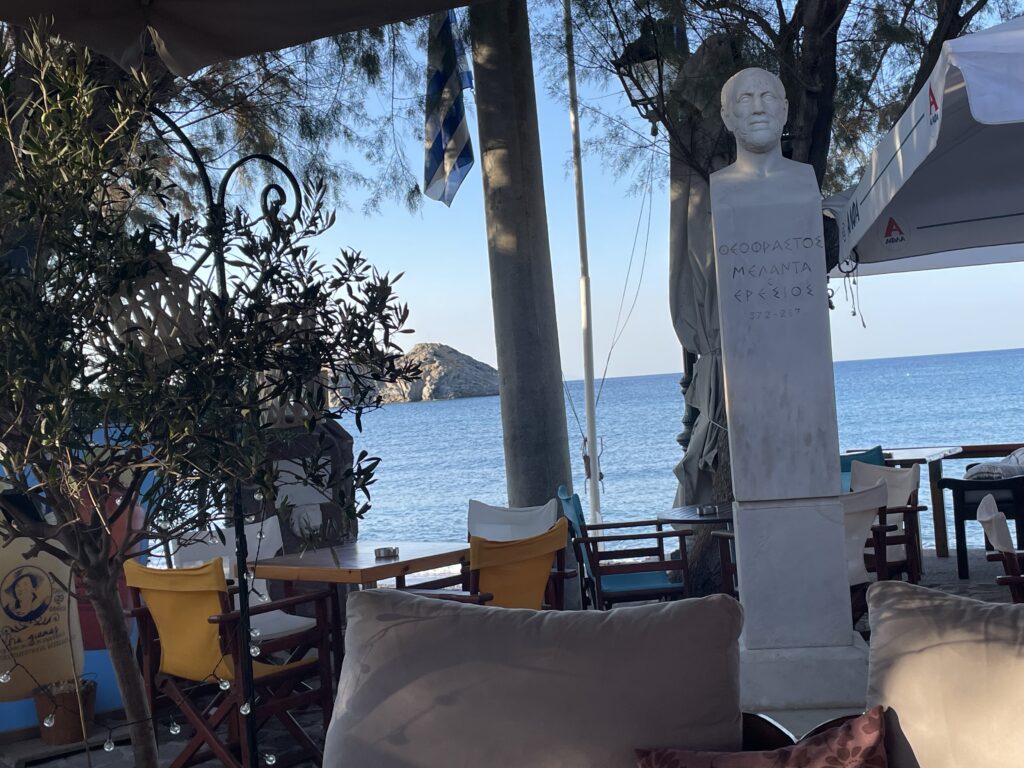
Article for in « Theophrastus society » in Greece
“On the Path of Theophrastus in Eressos, the father of ecology” is my Ithaca
By Mina Rad
French documentary filmmaker, producer ( World Cultural Diversity production), festivals director,
What pushed you to make this film ? Why are you inspired by Theophrastus?
When I look at the island in Eressos, the waves sing this poem of Konstantínos Kaváfis in my mind:
« When you set out on your journey to Ithaca,
pray that the road is long,
full of adventure, full of knowledge….”.
“On the Path of Theophrastus, the father of ecology,” is a Serie of documentaries that I am making in Lesbos. It has been my Ithaca.
Eressos village with its ancient history has offered me the most inspiring, journey in time, in history, in philosophy and in discovering Eressians rooted in their ancient cultural heritage, Eresian civilization.
I look at the journey that I have made writing, filming, editing, producing and distributing, I realize how rich the road was.
I returned to the island of Lesbos in Greece the ancient crossroad between East and West in 2022. It was 30 years ago that I had discovered Lesbos on a motorcycle through unpaved roads as a young traveller and an international journalist.
During all these years I kept the smell of aromatic plants; the oregano and thyme and the taste of the magic figs in my mouth. I kept in my memory the sun rising above the yellow mountains and the petrified forest.
The land of pyroclastic rocks, petrified forests, mountains coloured with rare flowers and plants, comprising more than 300 varieties of birds, nearly eleven million olive trees, thousands of Chestnut, palm and fig trees.
It’s in the context of global warming and climate change, that I decided to return to Lesbos to learn more about the Eressians philosopher and father of ecology, Theophrastus.
The history of botany owes to Theophrastus the first systematic classification and explanation of plants and their uses. He is the founder of Botany.
Theophrastus is the founder of Botany and we owe to him the first systematic classification and explanation of plants and their uses.
I wanted to understand with global warming what contribution and initiatives we can make to “save our planet”.
I came to Lesbos to find out how much his memory is still alive and What was his philosophy?
Through this journey, I have been able to discover the people, the places, the plantations, the petrified forest, Geopark and the old civilisation of Eressos, and a way of living in this village through which we can save our planet for future generations.
The book of Suzanne Amigues “Theophrastus of Eressos” was my guide. Her description on flowers, trees and wine helped find the characters of the film who can explain more about the father of botany.
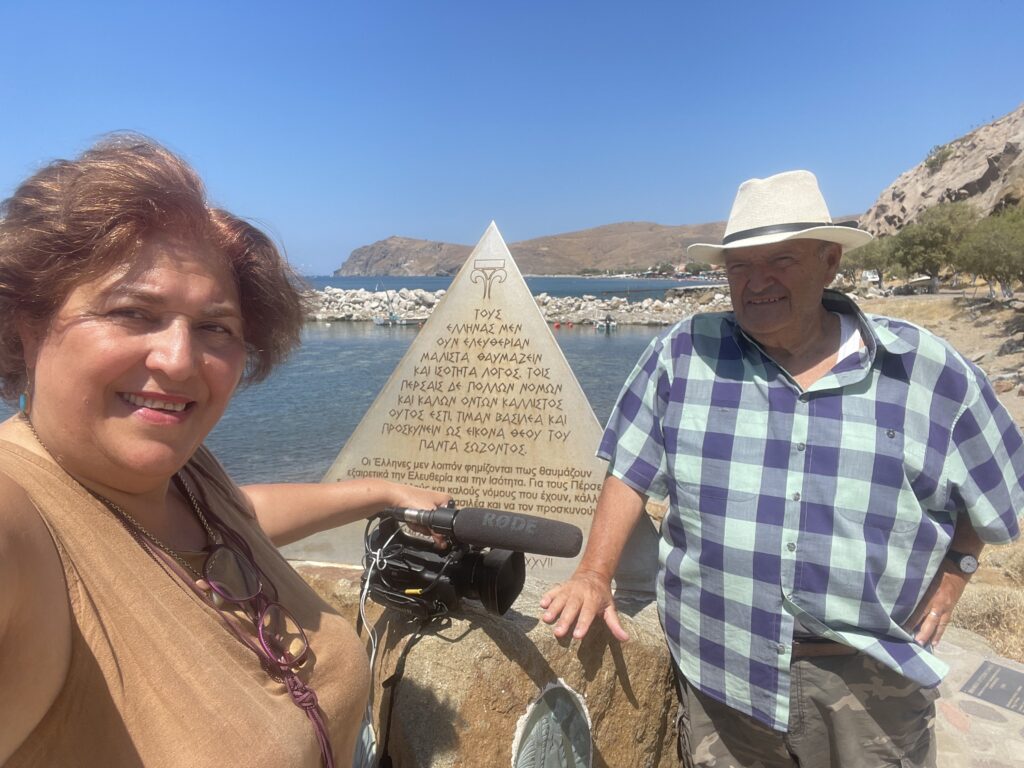
What has impressed you more during the film ?
Sitting in front of the Vigla, watching the hill where the Acropolis and the rocks around it have kept the secrets of the old Eressian history, (since the 5th century bc), has been inspiring.
The rocks, the trees, the cultivation of grapes, the old walls and the ruins around it have kept the memory of the past.
I searched for the followers of Theophrastus. I looked for the people who practice bio agriculture. Through the cultivation of grapes, of olive trees and the bio farms, in Sigri and in Eressos, I realised how “seasonality, freshness, locality” can be the solution for each of us to save our planet.
The great revelation was the discovery of philosopher,Theophrastus, historian, Phanias and the poet, Sappho and their words on the monument in the form of a pyramid.
When the whole world is in danger of climate change, the words of Theophratsus “praise and love our planet earth”show us the solution to save our planet.”
As an Iranian who now lives in France, I was deeply moved by the sentence of Phanias : “looking for equality and democracy”.What he said in 4th bc is still a reality of the political situation today!
The message of Sappho invites us “to love and not to make war” while the war rages all around the world .
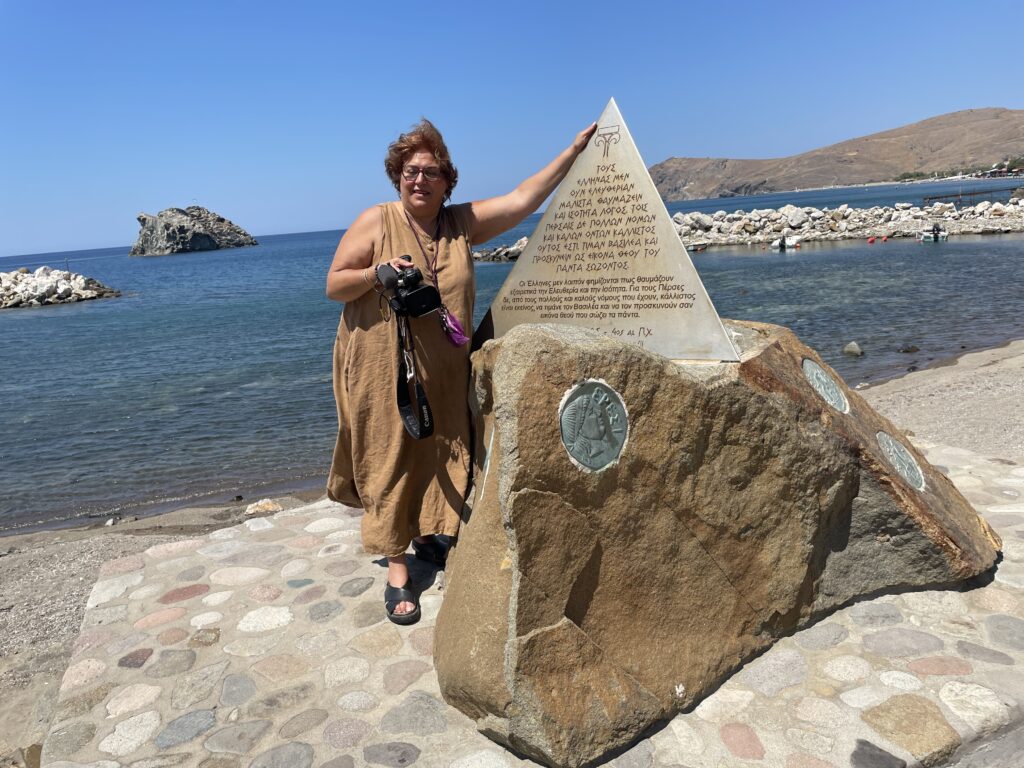
How was the process of filming, editing and producing this film ? What was your method ?
“It is better to make a short film, that create curiosity than make a long film that make people sleep” . After having made more than ten documentaries on cultural heritage in France, Canada, Iran and Brazil, I have always this sentence in my mind during the editing of the film. That is why instead of making a long film, I decided to make a trilogy.
Jean Rouch the father of documentary in France, says, “We make the film with the characters not about them”. He used to ask for feedback from his characters.
The process of making this film has been participatory and collaborative. The film has been developed by asking for “feedback” from the characters and integrating their point of view.
Each part of the film has been completed and edited after each feedback. The trilogy is done “with” the people who are in the film.
With the voluntary works of all of us, author, filmmaker, producer, composer editor and characters, we have been developing this film during the summer of 2023.
With the German editor, Thomas Balkenhol, based in Mytilene, we showed different editions of the film to each character to get their feedback.
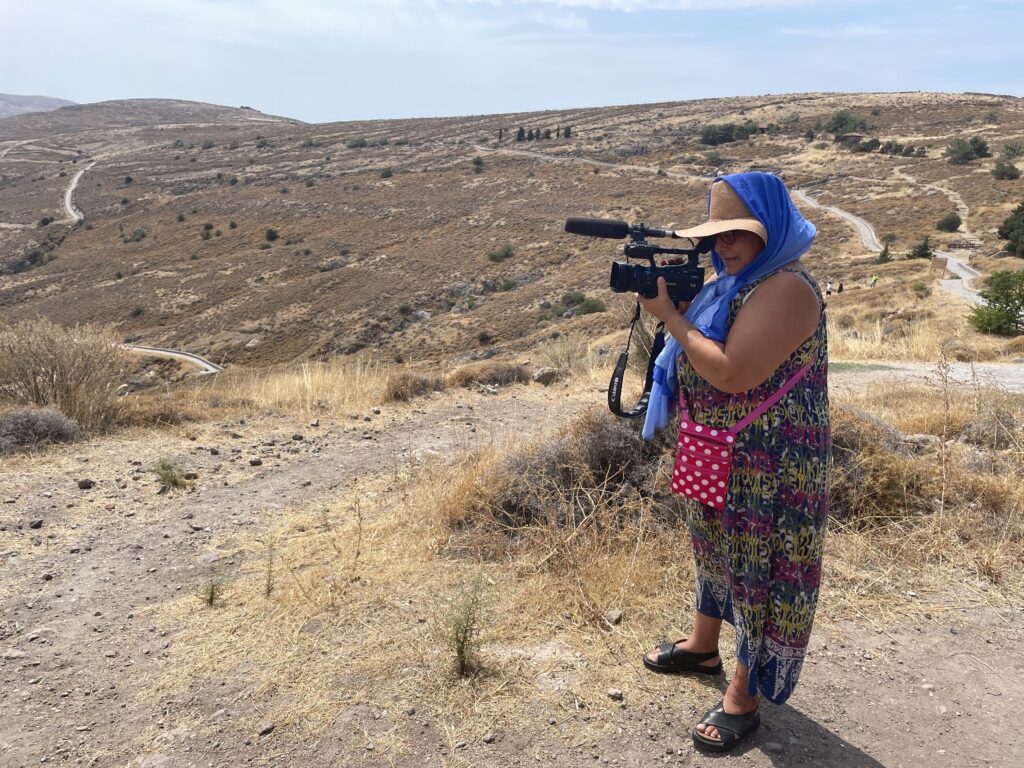
Why a Trilogy? What is the content of the Trilogy and for which audience is it intended?
After showing the last long version of the film to all the characters, and listening to their remarks, we decided to make not only a long film but a trilogy and focus each part on one of the specific themes of the film. The trilogy is more focused. Different audiences can be better targeted by the film : universities, historians, ecologists, historians, botanists, Eressians, …
The first part of the trilogy is about the Theophrastus of Eressos, his birthplace, his relation to Aristotle and the way that his work has survived. It is in Greek.
The second part of the trilogy is based on Theophrastus the father of botany and ecology; his message and his research.
The third part of the trilogy is based on the people who follow the path of Theophrastus by bio farming and the initiatives they take to save our planet.
The second and third part of ecology are in English and German.
This trilogy documentary has been an incredible journey, I finished the film and left Lesbos full of constructive impressions. I have been inspired by all the people I met and their initiatives to change how we live. These initiatives show, that each one of us can follow the path of Theophrastus and his philosophy to save our planet.
This journey encouraged me to prepare another series of documentaries about the scientific work of Theophrastus that will be the subject of my future creation.
Today I have discovered another Lesbos, different from what I saw 30 years ago. The cultural and natural heritage of the past is valued more by the initiatives of the Eressians and the people in Lesbos.
Now that fire has invaded Greece and flooding has destroyed towns, more than ever, we need to follow the path of Theophrastus. The journey for us is just beginning.
Now when I think about Lesbos, The memory of the waves can sing this poem of Konstantínos Kaváfis in my mind :
« Ithaca has given you the beautiful voyage.
Without her you would have never set out on the road. »
“Lesbos has given me the beautiful journey to time and history,
Without Lesbos I would have never set out on the road of the father of botany.”
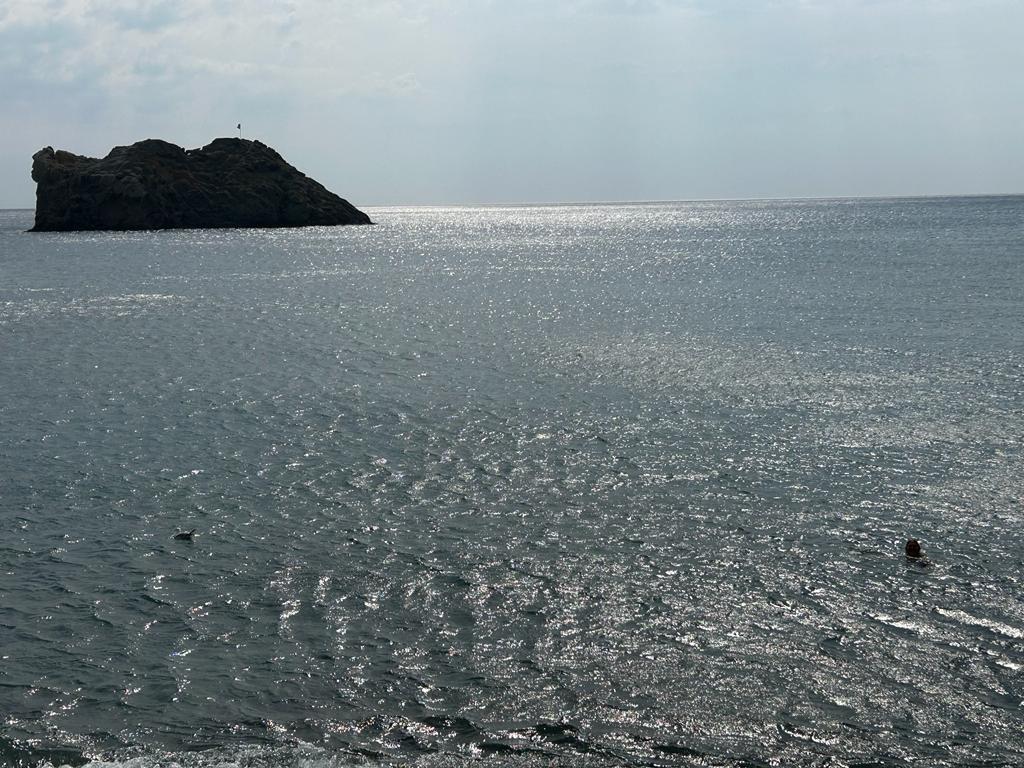
« Common house is Earth, for both gods and humans. And we must all, bending on her as our nurse and mother, praise and love her with affection, because she gave birth to us ». – THEOPHRASTOS OF ERESOS, 4th C. BC. [Porphyrios « On piety », – Fr. 19]
« So, about Greeks it is said that they admire liberty and equality excessively. For Persians though from the many and good laws they have, the best one is the one to honor and worship (kotow) the king as God’s image who saves all ». – PHANIAS OF ERESOS, 4th C. BC. [PLUTARCH « THEMISTOCLES », 27]
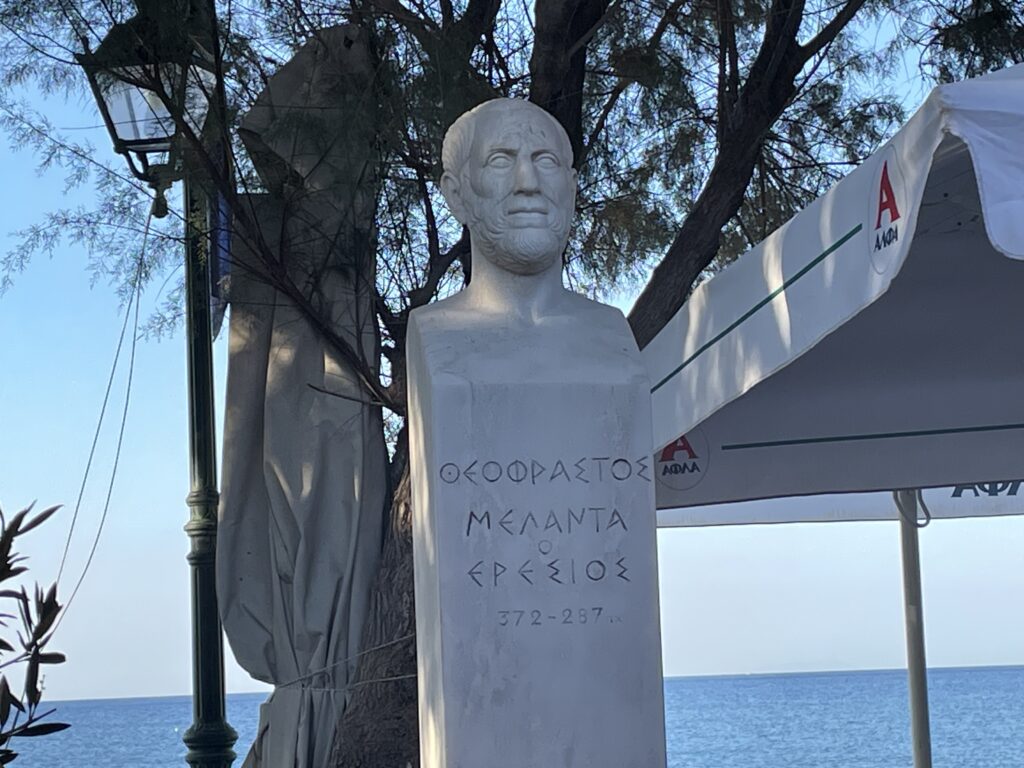
Article in Greek
**
«Στο μονοπάτι του Θεόφραστου στην Ερεσό, του πατέρα της οικολογίας»: Αυτή είναι η
Ιθάκη μου.
Συνομιλώντας με τη Mina Rad, σκηνοθέτη και παραγωγού γαλλικών ντοκιμαντέρ ( World Cultural Diversity Production), διευθύντρια φεστιβάλ.
Τι σας ώθησε να κάνετε αυτή την ταινία; Πώς σας ενέπνευσε ο Θεόφραστος;
Όταν κοιτάζω το νησί στην Ερεσό, τα κύματα τραγουδούν στο μυαλό μου αυτό το ποίημα τουΚωνσταντίνου Καβάφη: «Σα βγεις στον πηγαιμό για την Ιθάκη, να εύχεσαι να ‘ναι μακρύς ο δρόμος,γεμάτος περιπέτειες , γεμάτος γνώσεις…». «Στο μονοπάτι του Θεόφραστου, του πατέρα της οικολογίας», είναι μια σειρά ντοκιμαντέρ που κάνω στη Λέσβο. Ήτανη Ιθάκη μου.Το χωριό Ερεσός με την αρχαία ιστορία του μου πρόσφερε το πιο εμπνευσμένο ταξίδι στο χρόνο, στηνιστορία, στη φιλοσοφία και στην ανακάλυψη των Ερεσσιωτών που έχουν τις ρίζες τους στην αρχαία πολιτιστική τουςκληρονομιά, τον ερεσιώτικο πολιτισμό. Κοιτάζοντας το ταξίδι που έκανα γράφοντας, κάνοντας τα γυρίσματα, τομοντάζ ,την παραγωγή και διανομή, συνειδητοποιώ πόσο πλούσιος ήταν ο δρόμος.
Επέστρεψα στο νησί της Λέσβου στην Ελλάδα, το αρχαίο σταυροδρόμι μεταξύ Ανατολής και Δύσης, το 2022. Ήταν πριν από 30 χρόνια που είχα ανακαλύψει τη Λέσβο, με μια μοτοσυκλέτα, μέσα από μηασφαλτοστρωμένους δρόμου,ς ως νεαρή ταξιδιώτισσα και διεθνής δημοσιογράφος. Όλα αυτά ταχρόνια κράτησα τη μυρωδιά των αρωματικών φυτών, τη ρίγανη και το θυμάρι και τη γεύση από τα μαγικά σύκα στο στόμα μου. Κράτησα στη μνήμη μου τον ήλιο να ανατέλλει πάνω από τα κίτρινα βουνά και το απολιθωμένο δάσος. Τη χώρα των πυροκλαστικών πετρωμάτων, των απολιθωμάτων, των βουνών χρωματισμένων με σπάνια λουλούδια και φυτά, που περιλαμβάνει περισσότερες από 300 ποικιλίες πουλιών, σχεδόν έντεκα εκατομμύρια ελιές, χιλιάδες καστανιές, φοίνικες και συκιές.
Στο πλαίσιο της υπερθέρμανσης του πλανήτη και της κλιματικής αλλαγής, αποφάσισα να επιστρέψω στη Λέσβο για να μάθω περισσότερα για τον Ερέσιο φιλόσοφο και πατέρα της οικολογίας, Θεόφραστο.
Η ιστορία της βοτανικής οφείλει στον Θεόφραστο την πρώτη συστηματική ταξινόμηση και εξήγηση των φυτών και των χρήσεών τους. Ήθελα να καταλάβω με την υπερθέρμανση του πλανήτη, τι συνεισφοράμπορούμε να έχουμε και τι πρωτοβουλίες μπορούμε να πάρουμε για να «σώσουμε τον πλανήτη μας».
Ήρθα στη Λέσβο για να μάθω πόσο ζωντανή είναι ακόμα η μνήμη του Θεόφραστου και ποια ήταν η φιλοσοφία του.
Μέσα από αυτό το ταξίδι μπόρεσα να ανακαλύψω τους ανθρώπους, τα μέρη, τις καλλιέργειες, το απολιθωμένο δάσος, το γεωπάρκο, τον παλιό πολιτισμό της Ερεσού, έναν τρόπο ζωής μέσω του οποίου μπορούμε να σώσουμε τον πλανήτη μας για τις επόμενες γενιές. Το βιβλίο της Suzanne Amigues «Theophrastus of Eressos» ήταν ο οδηγός μου. Η περιγραφή της για τα λουλούδια, τα δέντρα και το κρασί βοήθησε να βρεθούν οι χαρακτήρες της ταινίας που μπορούν να εξηγήσουν περισσότερα για τονπατέρα της βοτανικής.
Τι σας έχει εντυπωσιάσει περισσότερο κατά τη διάρκεια του γυρίσματος της ταινίας;
Το να κάθεσαι μπροστά στη Βίγλα, να βλέπεις τον λόφο όπου η Ακρόπολη και οι βράχοι γύρω της έχουν κρατήσει τα μυστικά της αρχαίας ιστορίας, (από τον 7ο αιώνα π.Χ.), είναι έμπνευση. Οι βράχοι, τα δέντρα, η καλλιέργεια των σταφυλιών, οι παλιοί τοίχοι και τα ερείπια γύρω τους έχουν κρατήσει τη μνήμη του παρελθόντος. Αναζήτησα τους οπαδούς του Θεόφραστου. Αναζήτησα τους ανθρώπους που ασχολούνται με τη βιολογική γεωργία. Μέσα από την καλλιέργεια των σταφυλιών, των ελαιόδεντρων και των βιολογικών αγροκτημάτων, στο Σίγρι και στην Ερεσό, συνειδητοποίησα πώς η «εποχικότητα, η φρεσκάδα, η εντοπιότητα» μπορεί να είναι η συμβολή του καθένα μας στη διάσωση τον πλανήτη μας.
Μεγάλη αποκάλυψη για μένα, ήταν τα λόγια του φιλοσόφου Θεόφραστου, του φιλόσοφου και ιστορικού Φανία και της ποιήτριας Σαπφούς πάνω στο μνημείο σε μορφή πυραμίδα . Όταν ολόκληρος ο κόσμος κινδυνεύει από την κλιματική αλλαγή, τα λόγια του Θεοφράστου «επαινείτε και αγαπάτε τον πλανήτη μας γη» μας δείχνουν τη λύση για να σώσουμε τον πλανήτη μας. Ως Ιρανή που ζει τώρα στη Γαλλία, με συγκίνησε βαθιά τη φράση του Φανία: «αναζητώντας την ισότητα και τη δημοκρατία». Αυτό που είπε τον 4ο π.Χ. εξακολουθεί να είναι πραγματικότητα της πολιτικής κατάστασης σήμερα! Το μήνυμα της Σαπφούς μας καλεί «να αγαπάμε και να μην κάνουμε πόλεμο» ενώ ο πόλεμος μαίνεται σε όλο τον κόσμο.
Πώς ήταν η διαδικασία των γυρισμάτων, του μοντάζ και της παραγωγής αυτής της ταινίας; Ποια ήταν η μέθοδος σας; «Είναι καλύτερο να κάνεις μια ταινία μικρού μήκους, που δημιουργεί περιέργεια, παρά να κάνεις μια μεγάλη ταινία που κάνει τους ανθρώπους να κοιμούνται». Αφού έχω κάνει περισσότερα από δέκα ντοκιμαντέρ για την πολιτιστική κληρονομιά στη Γαλλία, τον Καναδά, το Ιράν και τη Βραζιλία, έχω πάντα αυτή τη φράση στο μυαλό μου κατά τη διάρκεια του μοντάζ της ταινίας. Γι' αυτό αντί να κάνω μια μεγάλη ταινία, αποφάσισα να κάνω μια τριλογία. Ο Jean Rouch, ο πατέρας του ντοκιμαντέρ στη Γαλλία, λέει: «Φτιάχνουμε την ταινία με τους χαρακτήρες, όχι σχετικά με αυτούς». Ζητούσε ανατροφοδότηση από τους χαρακτήρες του, ενσωματώνοντας τις απόψεις τους. Ακολουθώντας τα βήματά του, η διαδικασία δημιουργίας αυτής της ταινίας ήταν συμμετοχική και συνεργατική, δηλαδή, η ταινία έχει αναπτυχθεί ζητώντας «ανατροφοδότηση» από τους χαρακτήρες και ενσωματώνοντας τηνάποψή τους. Κάθε μέρος της ταινίας έχει ολοκληρωθεί και μονταριστεί μετά από κάθεανατροφοδότηση. Με την εθελοντική δουλειά όλων μας, κειμενογράφου, σκηνοθέτη, παραγωγού, μοντέρ και χαρακτήρων που εμφανίζονται, δημιουργήσαμε αυτή την Τριλογία, το καλοκαίρι του 2023.
Γιατί Τριλογία; Ποιο είναι το περιεχόμενο της Τριλογίας και για ποιο κοινό προορίζεται;
Αφού δείξαμε την τελευταία μεγάλη έκδοση της ταινίας σε όλους τους χαρακτήρες και ακούσαμε τις παρατηρήσεις τους, αποφασίσαμε να κάνουμε όχι μια μεγάλη ταινία, αλλά μια τριλογία, και να επικεντρωθούμε σε συγκεκριμένα επιμέρους θέματα. Η τριλογία, έτσι, είναι πιο εστιασμένη και στοχεύει σε κοινό με διαφορετικά ενδιαφέροντα: πανεπιστήμια, ιστορικοί, οικολόγοι, βοτανολόγοι,
Ερέσιοι…
Το πρώτο μέρος της τριλογίας αφορά τον Θεόφραστο της Ερεσού, τη γενέτειρά του, τη σχέση του με τον Αριστοτέλης και τον τρόπο που έχει διασωθεί το έργο του. Είναι στα ελληνικά.
Το δεύτερο μέρος της τριλογίας αφορά στο μήνυμα και την έρευνα του Θεόφραστου ως πατέρα της βοτανικής και της οικολογία.
Το τρίτο μέρος της τριλογίας αφορά στους ανθρώπους που ακολουθούν το «μονοπάτι του
Θεόφραστου» με βιοκαλλιέργειες και πρωτοβουλίες που αναλαμβάνουν για να σώσουν τον πλανήτη μας. Το δεύτερο και τρίτο μέρος της οικολογίας είναι στα αγγλικά και στα γερμανικά.
Αυτό το ντοκιμαντέρ τριλογίας ήταν ένα απίστευτο ταξίδι. Τελείωσα την ταινία και έφυγα από τη Λέσβο γεμάτη εποικοδομητικές εντυπώσεις. Έχω εμπνευστεί από όλους τους ανθρώπους που γνώρισα και τις δικές τους πρωτοβουλίες για να αλλάξουν τον τρόπο που ζούμε. Αυτές οι πρωτοβουλίες δείχνουν ότι ο καθένας από εμάς μπορεί να ακολουθήσει το μονοπάτι του Θεόφραστου.
Αυτό το ταξίδι με ενθάρρυνε να ετοιμάσω άλλη μια σειρά ντοκιμαντέρ για το επιστημονικόέργο του Θεόφραστου. Σε αυτό το ταξίδι ανακάλυψα μια άλλη Λέσβο, διαφορετική από ό,τι έβλεπα πριν από 30 χρόνια. Η πολιτιστική και η φυσική κληρονομιά του παρελθόντος εκτιμάται περισσότερο και αυτο φαίνεται στις πρωτοβουλίες που παίρνουν πολλοί άνθρωποι στη Λέσβο.
Τώρα που η φωτιά έχει εισβάλει στην Ελλάδα και οι πλημμύρες έχουν καταστρέψει ύπαιθρο και πόλεις, εμείς είναι ανάγκη να ακολουθήσουμε, περισσότερο από ποτέ, το μονοπάτι του Θεόφραστου.
Το ταξίδι για εμάς μόλις ξεκινά. Τώρα που σκέφτομαι τη Λέσβο, η μνήμη των κυμάτων ψιθυρίζει στο μυαλό μου αυτό το ποίημα του Κωνσταντίνος Καβάφης:
« Η Ιθάκη σας χάρισε το όμορφο ταξίδι. Χωρίς αυτήν δεν θα βγαίνατε ποτέ στο δρόμο. »
Η Λέσβος μου χάρισε το όμορφο ταξίδι στον χρόνο και την ιστορία. Χωρίς τη Λέσβο δεν θα έβγαινα ποτέ στον δρόμο του πατέρα της βοτανικής.
